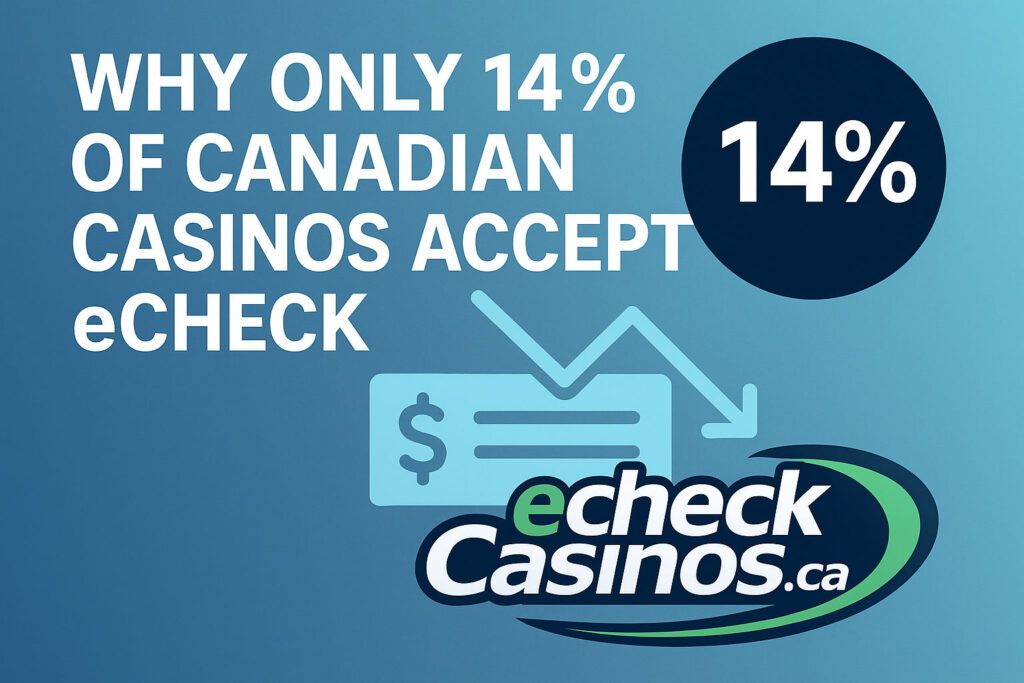
According to our latest market study dated May 2024, only 21 out of 150 iGaming brands accepted eCheck. This means a small 14% rate of acceptance. 2025 saw the introduction of two new eCheck brands, namely the relaunch of Spin Palace (a spinoff from Spin Casino) and the launch of Grizzly’s Quest, Baytree’s latest iGaming brand serving ROC (Rest of Canada) players.
Still, these two additions — when you factor in the growing number of brands — did little to move the needle. In fact, Ontario brands in general didn’t see any exciting new eCheck additions as of late. So we can only expect the acceptance rate to stay within the same range for the next market study.
In this article, we will try to explain why the eCheck acceptance rate has stayed stagnant from 2024 to 2025, reveal the hidden barriers, and where fintech is headed in the near future.
eCheck Integration Challenges
These are manifold and mostly fintech-related. When a merchant wants to offer eCheck, they usually need to work through a supplier that leases API technology to them. This supplier acts as the backend, so to speak, and the casino site or merchant plugs the API into the front end — namely, the player cashier. Why does this cause challenges? Well, first, the API requirements for eCheck processing are usually complex. So not only do individual casinos need to approach a fintech supplier with eCheck know-how, but they also need to implement it into their backend.
This difficulty is compounded by the fact that merchants can’t usually use the vanilla version of eCheck processing due to rampant abuse in iGaming. For example, we’ve seen that Baytree disables the eCheck feature for new player accounts, and that Casino Rewards typically requires one deposit via an APM before unlocking it. This basically means iGaming merchants need bespoke or custom APIs to serve their players. Typically, the API comes from a leasing company — like eMerchantBroker, one of the known suppliers of eCheck processing in high-risk verticals — but the customization must come from the casino’s own engineers.
With eCheck being somewhat phased out in favour of newer methods like crypto, the technical know-how among fintechs offering this service has become more limited. It seems that those still offering it are the same ones who offered it in the past — and never stopped. However, new entrants offering eCheck are now quite rare. This legacy-style usage and absence from modern cashiers helps explain why the acceptance rate has remained low and stagnant from 2024 to 2025.
However, there’s more to this. For example, there are bank-specific authentication protocols that need to be respected in Canada, so integrating a wide range of institutions comes with added difficulty. Lastly — and not least — this creates a money issue. Most casino operators stop considering eCheck when they compare the integration costs to the projected transaction volume. I think this is common sense. If eCheck isn’t popular enough, why go through the hassle in the first place? The ROI won’t be there.
This is especially true for crypto-specific sites. These sites know they draw non-fiat users, so in general, they wouldn’t be responsive to using eCheck. Their players don’t have the eCheck mindset. As such, the integration costs wouldn’t make sense because they would far exceed the benefit. A counterexample to this would be older iGaming providers like Casino Rewards. They have a massive player base, and eCheck is their second most popular option after Interac. In this case, losing eCheck or not offering it anymore would seriously hurt their business model.
So I think a big part of these integration challenges comes down to cost versus reward.
Regulatory and Compliance Barriers
These come into three main buckets.
Provincial Licensing Requirements
A lot of people don’t know this, but in Canada, money transmission is regulated at the provincial level. This means casinos may need separate licenses to legally process eCheck payments in different provinces — for example, in Ontario (which is legal), Alberta (soon to be legalized), and Quebec. This adds layers of cost and complexity. Of course, brands could focus on their most active province, but that might deter players from elsewhere.
FINTRAC Reporting Obligations
Because eCheck falls under Electronic Funds Transfer (EFT) rules, casinos must comply with their specific reporting standards.These are typically managed by FINTRAC. That includes tracking, verifying, and reporting certain transactions. Just like with other fiat-type methods — as part of efforts to prevent money laundering and fraud.
KYC and Bank Account Linking
eCheck payments require full KYC (Know Your Customer) verification. This has become a given here, however here KYC is extended because you need to link to a real Canadian bank account. This slows down onboarding for new players. Merchants find this also creates more friction compared to wallet-based or crypto methods.
Risk Management Concerns
This is the big one for iGaming merchants, and usually what makes them shy away from eCheck entirely. Chargeback rates are higher compared to credit cards, Interac, or other fiat methods. As you know, chargebacks are nearly impossible with crypto, since payments are irreversible. But in the antiquated world of digital checks, chargebacks remain a pain point — and a key weakness of this particular deposit modality.
We entered into this subject in depth in our Payper Inc review page, but the gist of the issue is that players exploit the long propagation time. If they lose, they contact their bank and claim they were victims of a scam — or that someone used their account for illegal gambling. To be clear, this is illegal, but for whatever reason, many players still try to game the system this way. If they win, they’re happy to cash out and never file a chargeback.
The sad truth is that a significant percentage of eCheck users are desperate. Maybe they’re dealing with money issues or trying to recoup losses, but they end up exploiting the weaknesses of the electronic check system to try and freeroll the casinos — often while also claiming bonuses. In practice, this usually leads to their accounts being banned, blacklisted, and in some cases, the blacklist is shared among operators. Occasionally, operators may even need to take legal action.
Last but not least, dispute resolution for merchants is much harder than with credit cards. Credit cards usually have strong consumer protections built in, allowing both sides of a transaction to present their case. But eCheck is more one-sided and geared toward the end user, with far fewer resources available for operators. In most cases, only basic bank-level support exists. Unscrupulous users take advantage of this, knowing that casinos often have little legal recourse.
In light of all these issues, most new merchants in 2025 are not looking to integrate eCheck into their cash flows. Another concerning risk is the volume of chargebacks per month. When this number gets too high, financial institutions may stop working with the merchant due to the perceived risk. So you can see why eCheck casinos are rare in 2025 — it’s simply hard to find operators willing to take on so much risk for a relatively small added convenience to their users.
Economic Factors
Processing Fees vs. Credit Card Interchange Rates
eCheck processing often comes with less predictable costs — especially for high-risk industries like iGaming. Credit card networks have standardized interchange rates, but eCheck processors may charge more due to fraud risk and settlement delays. For many casinos, it’s just not a better deal for their bottom line.
Minimum Volume Requirements
Many payment processors require a minimum transaction volume. If a casino doesn’t hit that monthly threshold, they may pay penalties or lose access to the service. This discourages smaller or newer operators from bothering with eCheck at all.
Implementation Costs vs. Projected ROI
Setting up eCheck isn’t plug-and-play — As we’ve seen it involves API integration, risk controls, fraud management, and compliance checks. And as we shared earlier, if the expected number of eCheck users is low, then the return on investment often doesn’t make sense. Casinos simply don’t see enough upside.
Competition from Instant Payment Alternatives
Modern payment options like Interac by Loonio, crypto, and instant bank transfers are faster, easier, and more familiar to today’s users. These alternatives also offer better fraud protection and smoother user experience. In comparison, eCheck feels outdated — and for many casinos, not worth the hassle.
The Path Forward
It seems eCheck is here to stay, even though some of its features may now appear antiquated compared to more modern solutions. However, an interesting trend we’ve been seeing is the rise of “enhanced Electronic Funds Transfers” in Canada. One example is Payper.ca’s “Online Banking Payment” solution — essentially a strengthened eCheck option with built-in anti-fraud features. Another is “Instant Bank Transfer” by PayDirect Billing Solutions. These two options are powerful because they’re not third-party eCheck services like Instadebit, but are available directly in the cashier.
These rare offerings come from teams with eCheck expertise who are working to patch its weaknesses while preserving the strong user experience. They aren’t a dime a dozen and are still hard to find — but in terms of the path forward, they’re a critical piece of the puzzle.
For us, the future lies in strengthened EFT solutions and open banking. With RTR (Real-Time Rail) and open banking on the horizon, the DNA of Canada’s payment landscape could naturally evolve to offer much greater security for eCheck-style deposits. This is something we’re actively tracking — and looking forward to.
What Casinos Considering eCheck Should Know
If you’re a casino operator thinking about offering eCheck, the first thing to understand is that it’s not a plug-and-play solution. It takes effort — from compliance and technical integration to managing fraud risks and chargebacks. It’s also not for every player base. eCheck tends to attract a very specific user profile: often older, bank-oriented players who value familiarity and direct bank transfers.
However, if your brand already leans toward a more traditional or high-trust audience — especially in Canada — then eCheck can still be worth it.It’s a quiet workhorse, and when implemented properly, it makes deposits feel more straightforward and supports long-term player retention.
The things to keep in mind: choose a solid API provider, be ready for custom implementation, and know that fraud protection is going to be your responsibility. But if you can handle that, eCheck can still hold its place as a modern cashier — especially when paired with stronger EFT implementation and future-ready open banking.





